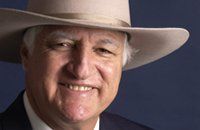Media Release
Warnings by KAP Leader and Federal Member for Kennedy Bob Katter two years ago of the long-term consequences to international relations from the premature ban on live exports have been echoed by Australia’s biggest cattle producer ahead of a cattle crisis meeting in Richmond, North Queensland today (Tuesday May 7).
Mr Katter, who has regularly met with the Indonesian Ambassador since the sudden live export ban, said resurrecting international relations was high on the agenda of graziers as they today plead with Federal and State Ministers at the crisis summit to support the industry.
“The frightening moral arrogance of extremist animal welfare groups has literally spat upon people in other countries,” said Mr Katter following concerns by overseas governments about being “dictated to” by Australia.
“Comments on meat processing in Egypt and Indonesia by government and rabid animal welfare groups has, quite rightly, been interpreted as the new face of ‘new colonialism’.
“They are the white faces killing our industry, saying we must educate these ‘poor primitive peoples to be morally superior like us’.
"History is full of misguided do-gooders and extremists such as animal welfare groups, a stance that will probably result in the death by starvation of cattle.
“The reality is that poor countries cannot afford to buy meat processed in Australia – it is too expensive – but they can afford meat that is grown-out and processed in Indonesia.
“The Australian people must know the downside of the ban. Our farmers have been destroyed. Only one in every 10 cattle families remains, and cattle numbers have dropped by 23 per cent – a number that would feed 12 million people who now go hungry.
“There’s no market for cattle with live export destroyed. Half a million head of cattle were lost as result of the ill-advised, without-warning closure of the Indonesian market two years ago and cattlemen were forced to shoot their oversupply of stock.”
Mr Katter said that apart from an urgent need to repair international relations, the domestic situation was now at such a crisis point that our governments must respond with initiatives on home soil.
“Ongoing issues such as the artificially-inflated $AUD and interest rates, property price plunges and questionable lending by the banks, as well as harsh weather events on top of a dwindling live export market, have seen a decrease in cattle prices not seen since the 1980s – and it just keeps getting worse.
“Cattle stations are drowning in debt and graziers walking off the land as they battle a diminishing market.
“Since they shut down the live export industry, cattle families have been treading water through good seasons of good weather and local sales. Seven out of eight years these cattlemen have had to put more money into their properties than what they are getting out. When you throw in the drought, which 13 shires in the region are currently declared as, the forecast is that graziers will see production halved over the next two years.
“Breeder properties are absolutely reliant on feed supplementation without which, there is limited production. Those supplement costs have grown by 35 per cent in the last six years. This paired with the demise of the live export industry means that from a freight perspective, they now have to send their store cattle some 1500km-2000km to market rather than 300km-500km previously.”
CONTACT DETAILS
INNISFAIL
Visit: Owen St And Edith St, Innisfail QLD 4860 Australia
Post: PO Box 1638 Innisfail, Qld 4860
MOUNT ISA
P: (07) 4743 3534
F: (07) 4743 0189
Visit: 42 Simpson St, Mount Isa City, QLD, Australia
Post: PO Box 2130 Mount Isa, Qld 4825
MAREEBA
P: 07 4092 1632
F: 07 4092 6114
Visit: 141 Byrnes St, Mareeba, QLD, Australia
CANBERRA
(when Parliament is sitting)
P: (02) 6277 4978
F: (02) 6277 8558
Local Call within the electorate
P: 1300 301 942
Email:Bob.Katter.MP@aph.gov.au

